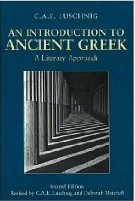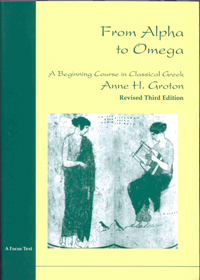Greek II: The Saga Continues in Ancient Greek (2009 Winter UCSC)
Notes on a 2009 course taught by Dr. Thomas Walsh
Highlight of second 10-week Ancient Greek class,
Greek II: The Saga Continues in Ancient Greek:
Highlight of first 10-week Ancient Greek class,
Greek I: Introduction to Ancient Greek:
Best translation practices
- Work sentence-by-sentence at first.
- Scan a sentence, looking for and resolving unknown vocabulary.
- Scan to get subject and verb.
- Scan backwards for parts of speech, to avoid being 'mesmerised by vocabulary'.
Day II.1
- Third Declension Nouns.
- Chapter 5, pp. 105-114 in Luschnig (An Introduction to Ancient Greek:
A Literary Approach).
- Assignment: Read pp. 105-114 of Chapter 5 of
Luschnig.
- Assignment: Make flash cards for Vocabulary Batch 1:
(primarily Third Declension nouns)
on pp. 110-112 in Luschnig.
- Assignment: Learn paradigm for Third Declension Nouns:
| Number
| m. and f.
| Case
| n.
|
| Sg.
| Often σ
| N
| Base
|
| Sg.
| - οσ
| G
| - οσ
|
| Sg.
| - ι
| D
| - ι
|
| Sg.
| - α [or -ν]
| A
| Same as Nom.
|
| Sg.
| Same as Nom. or Base
| V
| Same as Nom.
|
| Pl.
| - εσ
| N
| - α
|
| Pl.
| - ων
| G
| - ων
|
| Pl.
| - σι[ν]
| D
| - σι[ν]
|
| Pl.
| - ασ
| A
| - α
|
- Learn orthographic and other changes for various consonant-ending bases and vowel bases.
Recite them aloud, slowly, learning the rhythm, then gradually speed up.
Day II.2.
- Review first dozen sentences of
Final exam for Greek I: Introduction to Ancient Greek (2008 Autumn UCSC).
- Review homework (Luschnig p. 107, Ex A.1):
parse the 3rd-declension nouns and supply the article to agree.
- Consonant-stem nouns.
- Subordinate clauses.
- Assignment: Parse and give proper form of article:
Luschnig p. 107, Ex B.2.
- Assignment: Translate sentences from
Luschnig p. 107, Ex B.3.
Day II.3
- Quiz #1: two paradigms of 3rd-declension (consonant-stem) nouns,
and identification of forms.
- In-class work on prepared exercises from
Luschnig.
- Assignment: Read
Luschnig Lesson VI, pp. 121-124.
Day II.4
- Third-declension Adjectives.
- Assignment: Make flash cards for Vocabulary Batch 2:
(primarily Third Declension adjectives)
on pp. 123-124 in Luschnig.
- Assignment: Learn paradigms for Third Declension Adjectives.
Day II.5
- Quiz #2: two paradigms of adjectives; translation of five phrases.
- Review of translation exercises and some of Chapter VI exercises.
- Assignment: Make flash cards for Vocabulary Batch 2:
(primarily Third Declension adjectives)
on pp. 123-124 in Luschnig.
- Assignment: Learn all the nouns and adjectives in
Vocabulary Batch 1
and
Vocabulary Batch 2.
Day II.6
- Writing sentences in Greek on board; group correction.
- Clauses.
Day II.7
- Quiz #3: paradigms of nouns and adjectives.
- More classroom work on sentences.
Day II.8
- Result clause ("so that"):
- Actual result clause: indicative verb for "with the result that ...".
- Natural result clause: infinitive verb for "with the tendency to ...".
- Temporal clause ("when ... until ... after ... before") including the over-loaded
πρíν:
|
πρíν
| positive (affirmative) main verb denotes
| before
|
|
πρíν
| negative main verb denotes
| after
|
- Ambiguity of "since" as temporal and causal.
- Conditional clause:
- if-clause: protasis; ’ει without accent.
- conclusion-clause: apodosis.
- Simple condition: takes indicative in protasis.
- Contrary-to-fact condition: takes past tense in both protasis and apodosis;
adds contrary-to-fact indicator (’'αν) in apodosis.
- Natural result clause: infinitive verb for "with the tendency to ...".
Day II.9
- Further review of sentences with Clauses as in Chapter 6 of
Luschnig.
- Greek sentences, reviewing condition constructs.
- Handout on homework common errors.
Day II.10
- Further review of sentences with Conditional Clauses: Chapter 6 of
Luschnig.
- "Mood interlude" introducing to the subjunctive
(not until Chapter 13 of
Luschnig):
- Form of the subjunctive:
- Omit the augment.
- Lengthen the thematic vowel:
|
ο (omicron)
| becomes
|
ω (omega)
|
|
ε (epsilon)
| becomes
|
η (eta)
|
- deliberative question (as in "what are we to do?").
- Functions of the subjunctive:
- Exhortation.
- Prohibition
- Deliberative question (as in "what are we to do?").
- Assignment: Read definition of participles on pp. 135-136 of Chapter 7 of
Luschnig.
- Assignment: Make flash cards for Vocabulary Batch 3 (Chapter 7)
on pp. 150-151 in Luschnig.
Day II.11
- "Mood interlude" on the subjunctive:
concepts and forms continued.
Day II.12
- "Mood interlude" on the subjunctive:
concepts and forms continued.
Day II.13
- Quiz on Vocabulary Batch 3 (Chapter 7)
on pp. 150-151 in Luschnig.
- Subjunctive interlude (preview of material in Chapter 13).
Stem (excludes the ε augment) takes endings:
- Active Subjunctive Present and Aorist endings as Active Indicative Present, but with
lengthened thematic vowel, where
|
ο
is replaced by ω
|
|
ε
is replaced by η
|
- Similarly Middle-passive Subjunctive Present and Middle Subjunctive Aorist endings
as Middle-passive Indicative Present, but with
lengthened thematic vowel.
Day II.14
- Subjunctive interlude (preview of material in Chapter 13) concluded.
- Participles:
- Attributive use when participles is used as an adjective.
- Circumstantial use when participle defines circumstances surrounding the action of the main verb.
Day II.15
- Participles: review of paradigms.
- Participles: seven meanings (temporal, etc).
- Participles: Genitive Absolute, for participle independent of the rest of the sentence.
- Start of review of sentences translated from Chapter 7 (part B).
Day II.16
- Quiz on participles (paradigms, recognition, and use) and subjunctive (recognition).
- Review of sentences translated from Chapter 7 (part B).
- Assignment of homework on translations (pp. 153-154).
Day II.17
- Conditional statements.
- Hints for translation algorithm:
- Know or look up (or estimate in an exam!) the vocabulary of the sentence.
- Identify verbs and participles and subjects of verbs.
- Make a literal translation.
- Convert into correct and natural English.
- Review for Midterm.
Day II.18
Day II.19
- Optative handouts.
- Small-group work on Herodotus translation.
- Assignment: Read
Luschnig on the Optative.
- Assignment: Translate first paragraph (number 53 in Connell's First Greek Reader)
of Herodotus on the Persian Wars.
Day II.20
- Optative handouts.
- Optative in main clauses.
- Small-group work on Herodotus translation.
Day II.21
- Optative in subordinate clauses.
- Assignment: Learn Vocabulary Batch 4:
(including relative interogatives and pronouns)
in Luschnig.
Day II.22
- More hints on
best translation practices.
- Brilliant: a quick diagnostic quiz on verb endings (to identify person as 1st, 2nd, or 3rd,
irrespective of number (singular/plural), mood, voice, or tense).
- Optative sentences from
Day II.21 handout.
Day II.23
Day II.24
Day II.25
-
False friends handout, listing sets of words that are often mistaken.
-
List of 400 or so vocabulary words learned so far. Excludes the
practical vocabulary encountered in Herodotus and other texts.
Day II.26
- Contract verbs. Included an interesting insight on why their accents appear to be non-recessive:
-
Homeric Greek shows the verbs BEFORE contraction occurred.
The accents are placed correctly as recessive in Homeric Greek.
-
But over the centuries contraction occurs, when the post-Homeric Greeks decided they disliked the sound
of two adjacent vowels and combined (contracted) them into a single vowel.
-
Despite the contraction, the accent remained where it has been before one vowel syllable was removed.
This means:
-
a penult circumflex can become an ultima circumflex;
-
an antepenult acute can become a penult circumflex or penult acute.
-
etc.
-
In retrospect, this is also probably the "real" cause of the "non-recessive" accent on an infinitive
whose ending is a contraction.
Day II.27
Day II.28
Day II.29
Day II.30
- Completed reading of text.
- Small-group collaboration on improving responses to
take-home component of final exam.
- Oral part of final exam.
Vocabulary growth
About 186 words from
vocabulary assigned in Greek I: Introduction to Ancient Greek.
8 parts of speech plus phrases:
Luschnig's pages
and chapters:
| Noun
| Pronoun
| Adjective
| Verb
| Adverb
| Conjunction
| Preposition
| Particle
| Phrase
| (II) Total
this batch
| (II) Total
so far
|
|
Batch 1 [pp. 110-112]
Chapter 5.
| 66
| -
| -
| 4
| 4
| 1
| -
| -
| 2
| 77
| 77
|
|
Batch 2 [pp. 123-124]
Chapter 6.
| 2
| -
| 26
| -
| 1
| -
| 1
| -
| -
| 30
| 107
|
|
Batch 3 [pp. 150-151]
Chapter 7.
| 1
| -
| -
| 21
| -
| -
| -
| 5
| 2
| 29
| 136
|
|
Batch 4 [p. 159]
Chapter 8.
| 4
| -
| -
| 2
| 1
| -
| 5
| -
| -
| 12
| 148
|
|
Batch 5 [pp. 168-169]
Chapter 8.
| 3
| -
| -
| 10
| -
| -
| -
| -
| -
| 13
| 161
|
|
Batch 7 [pp. 178-179]
Chapter 9.
| 8
| 8
| 5
| 8
| 4
| -
| 3
| -
| -
| 36
| 197
|
Midterm
- Paradigms: 3rd-declension nouns; participles; κτλ
(30 minutes).
- Sentences
(40 minutes). Identify and translate:
- Result clauses (natural and actual).
- Temporal clauses: including
πρíν).
- Conditions: including present and past simple versus unreal.
- Participles: different kinds in sentences.
Final
- Orals: read aloud half a dozen lines (your choice) from the reader.
Pay attention to breathing, double consonants, consistency of pronunciation
(particularly vowels, diphthongs, and iota-subscripts).
- Take-home component: specify PNMTV for verbs (add Case and Gender for participles):
- Contract verbs.
- -MI verbs.
- In-class component part 1:
- Decline various adjectives, third declension nouns, and verbs (subjunctive and optative; also perfect).
- Identify a dozen forms and answer a question on it.
- List seven types of circumstantial participles.
- Give the 6 principle parts and meanings for 6 verbs.
- In-class component part 2: for a dozen sentences adapted from the Reader, translate each sentence
and give answer to a question for each:
- For participle identification: specify attributive, supplementary, or circumstantial (which of the
7 types).
- For clause identification: specify result, actual or natural, temporal, causal,
purpose, indirect discourse, conditional (and what kind of condition).
References
 [Thanks for visiting.]
[Thanks for visiting.]
 Disclaimer
Disclaimer
 Links.
Links.
 Books read recently.
Books read recently.
 Best books read.
Best books read.
 Harry Potter books.
Harry Potter books.


